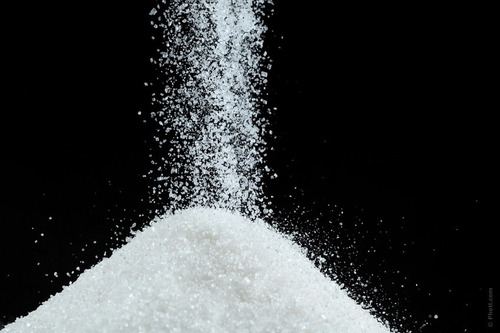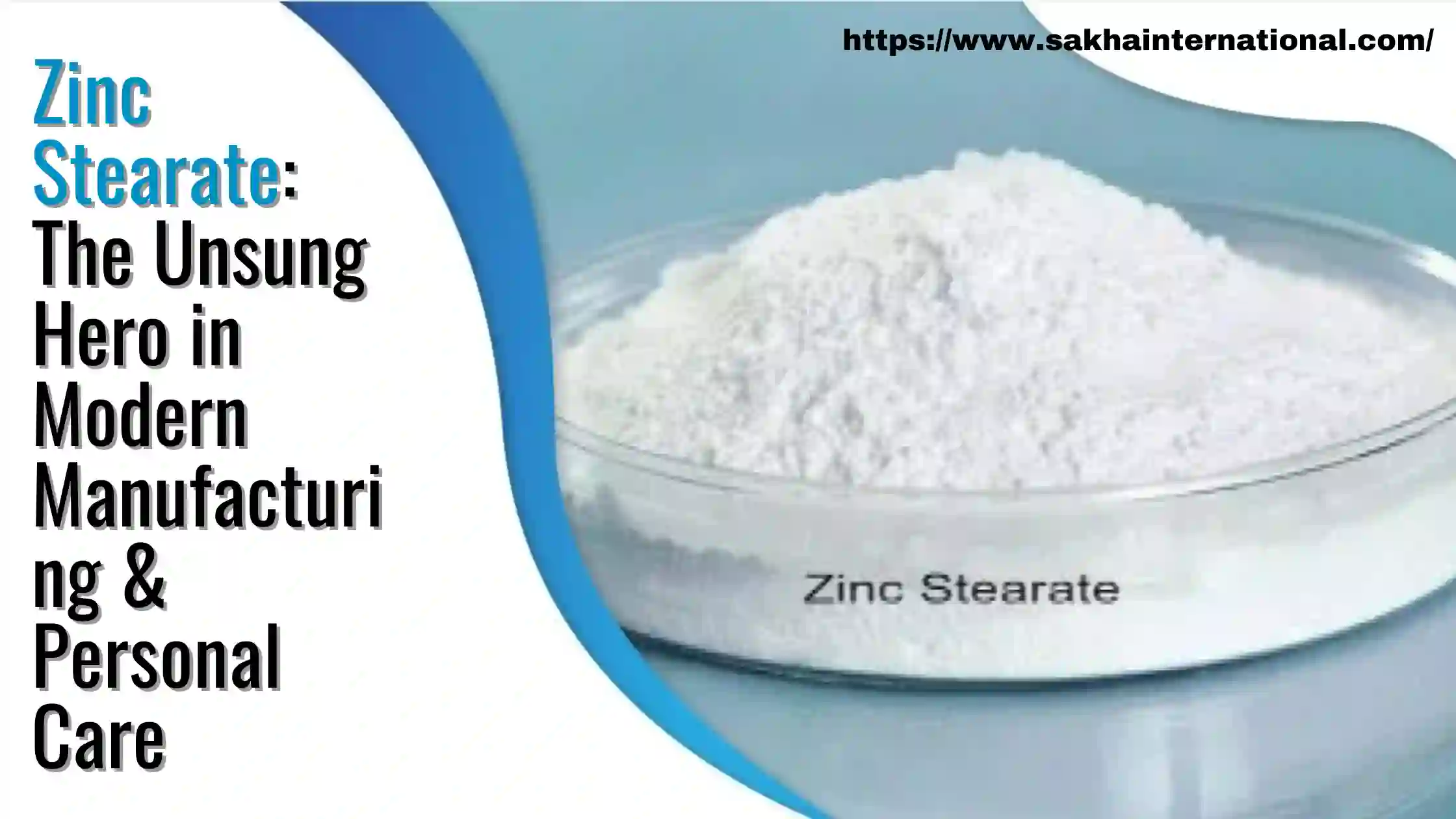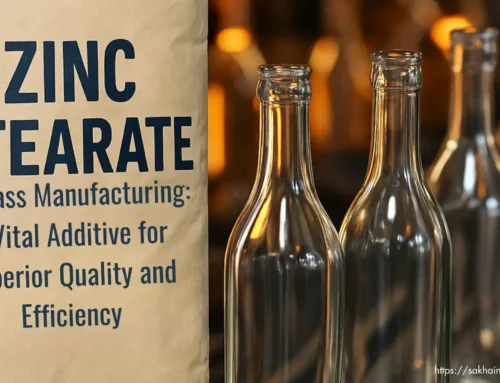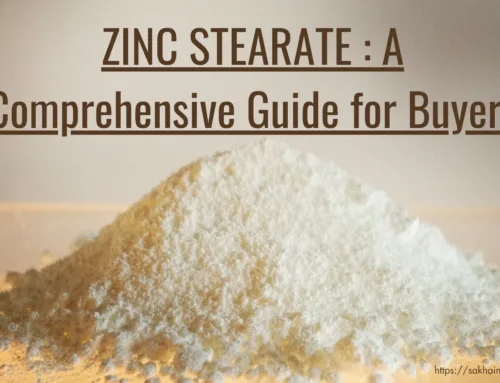The Unsung Hero of Personal Care is Zinc Stearate

In recent years, the global manufacturing and personal care industries have undergone a significant transformation, with a growing emphasis on sustainability and environmental responsibility. This shift towards sustainable practices has been driven by increasing awareness of environmental issues, regulatory pressure, and changing consumer preferences. As a result, manufacturers are seeking innovative solutions to reduce their environmental impact while maintaining product quality and performance.
Zinc stearate, often referred to as “zinc soap,” is a white, odorless powder with a surprisingly wide range of applications in modern manufacturing and personal care. This blog by Sakha International, a leading supplier of high-quality zinc stearate, delves into the multifaceted world of this versatile ingredient. We will explore its role in sustainable practices, production advancements, health and safety benefits, and its impact on various industries.
The Importance of Sustainable Practices Sustainability has become a critical consideration for businesses across all industries. In addition to addressing environmental concerns, adopting sustainable practices can enhance brand reputation, attract environmentally-conscious consumers, and drive long-term business growth. From reducing carbon emissions to minimizing waste and conserving natural resources, sustainable practices are integral to creating a more environmentally friendly and socially responsible manufacturing sector.
The Green Revolution: Zinc Stearate and Sustainability

The manufacturing landscape is undergoing a significant shift towards sustainable practices. Zinc stearate plays a crucial role in this movement:
- Reduced Environmental Impact: Zinc stearate acts as a release agent, facilitating the easy removal of products from molds during production. This reduces waste and the need for harsh chemicals to clean molds, minimizing environmental impact.
- Sustainable Sourcing: Manufacturers are increasingly sourcing zinc stearate from companies like Sakha International that prioritize responsible practices. We utilize ethically sourced raw materials and sustainable production processes.
The Role of Zinc Stearate in Sustainable Manufacturing Zinc stearate, a commonly used chemical compound in manufacturing and personal care products, plays a significant role in advancing sustainable practices. As a versatile and environmentally friendly ingredient, zinc stearate offers several key benefits that contribute to sustainability:
- Biodegradability: Zinc stearate is biodegradable, meaning it can break down naturally over time without harming the environment. Unlike some synthetic additives, zinc stearate does not accumulate in the environment, reducing the risk of pollution and ecosystem damage.
- Renewable Sourcing: Manufacturers can source zinc stearate from renewable and sustainable sources, such as plant-based or recycled materials. By using responsibly sourced zinc stearate, companies can minimize their environmental footprint and support sustainable supply chains.
- Energy Efficiency: The production of zinc stearate requires relatively low energy input compared to other chemical compounds, making it an energy-efficient option for manufacturers. By reducing energy consumption during production, zinc stearate contributes to overall energy savings and environmental sustainability.
How Zinc Stearate Reduces Environmental Impact Zinc stearate offers several environmental advantages that make it an ideal choice for sustainable manufacturing:
- Reduced Pollution: Unlike some chemical additives, zinc stearate does not release harmful pollutants or toxins into the environment during production or use. Its biodegradable nature ensures that it breaks down naturally, minimizing the risk of pollution and environmental contamination.
- Minimal Waste: The production of zinc stearate generates minimal waste, as by-products can often be recycled or reused in other processes. This reduces the amount of waste sent to landfills and helps conserve valuable resources.
- Lower Carbon Footprint: Zinc stearate production typically requires less energy compared to alternative additives, resulting in a lower carbon footprint. By choosing zinc stearate, manufacturers can reduce their overall greenhouse gas emissions and contribute to mitigating climate change.
Case Study: Eco-Friendly Electronics with Zinc Stearate

A leading electronics manufacturer aimed to reduce their environmental footprint. By incorporating a specifically sourced, high-purity zinc stearate from Sakha International into their production process, they achieved:
- Reduced Water Usage: The use of zinc stearate minimized the need for water-intensive cleaning processes for their molds.
- Improved Resource Efficiency: Easier product release from molds led to less material waste and improved resource utilization.
This case study exemplifies how zinc stearate can contribute to a more sustainable manufacturing ecosystem.
Case Studies of Companies Implementing Sustainable Practices with Zinc Stearate
Beauty Products Manufacturer A leading beauty products manufacturer implemented zinc stearate in its line of cosmetics and skincare products as part of its sustainability initiative. By sourcing responsibly produced zinc stearate.
Pushing Boundaries: Advancements in Zinc Stearate Production Technology
The production of zinc stearate is constantly evolving, with recent advancements leading to:
- High-Purity Zinc Stearate: New technologies allow for the production of zinc stearate with even higher purity levels, ensuring consistent performance and quality in end products.
- Enhanced Functionality: Advancements in processing techniques enable the creation of zinc stearate with customized properties for specific applications.
The Impact on Product Performance: High-purity zinc stearate translates to improved performance in end products. For example, in personal care formulations, it facilitates smoother textures and enhanced product stability.
Future Trends: The future of zinc stearate production is likely to see further innovations in areas like nanotechnology and bio-based processing methods.
Safety First: The Benefits of Zinc Stearate in Personal Care

Zinc stearate boasts a well-established safety profile, making it a valuable ingredient in personal care products:
- Non-toxic and Hypoallergenic: Zinc stearate is generally considered safe for use on skin and is unlikely to cause irritation or allergic reactions.
- Enhanced Safety Profile: It acts as a thickener and bulking agent, allowing for the reduction of potentially harsher ingredients in formulations.
Regulatory Landscape: Regulatory bodies like the FDA and Europe’s Cosmetics Regulation (EC) No 1223/2009 have established safety guidelines for zinc stearate in personal care products. Sakha International ensures our zinc stearate products comply with all relevant regulations.
The Release Agent King: Zinc Stearate in Polymer and Plastic Industries
Zinc stearate reigns supreme as a release agent and lubricant in the production of various polymers and plastics:
- Essential for Smooth Production: It ensures the effortless release of molded plastic products, preventing defects and improving production efficiency.
- Biodegradable Plastics: Zinc stearate can be used in conjunction with biodegradable plastics, further enhancing the sustainability profile of these materials.
Innovation in Polymer Blends: Research is ongoing to explore the use of zinc stearate in novel polymer blends. These blends could offer improved strength, flexibility, and other desirable properties.
Optimizing Performance: Leveraging Zinc Stearate in Various Products
Zinc stearate’s versatility extends beyond its role as a release agent. It offers a range of benefits in various product formulations:
- Improved Texture and Application: In cosmetics, zinc stearate thickens creams and lotions, enhancing their texture and making them easier to apply.
- Enhanced Delivery of Active Ingredients: It can act as a carrier for active ingredients in personal care products, facilitating their penetration into the skin.
- Comparative Analysis: Zinc stearate offers advantages over other metallic stearates like calcium stearate. It possesses superior lubricating properties and is generally considered less prone to cause discoloration.






Leave A Comment